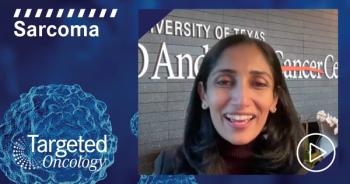
Choosing Therapy for NSCLC to SCLC Transformation in EGFR+ Disease
Ravi Salgia, MD, PhD, discusses how to address and treat transformation from non–small cell lung cancer to small cell lung cancer.
Ravi Salgia, MD, PhD, medical oncologist, professor, and the Arthur & Rosalie Kaplan chair in medical oncology & therapeutics research at City of Hope’s comprehensive cancer center, discusses how to address and treat transformation from non–small cell lung cancer (NSCLC) to small cell lung cancer (SCLC).
Salgia says that in some cases, it can be a slow transformation that only affects 1 disease site; in this case, radiotherapy or another approach that targets that site should be considered.
Other cases of small-cell transformation can be faster and more aggressive forms of SCLC, which can occur in patients with an EGFR mutation as well as p53 and Rb alterations. In these cases, he says physicians may consider continuing the TKI while giving chemotherapy. Alternatively, they can give chemotherapy and immunotherapy. Physicians should also determine if the patients now qualify for any clinical trials that could offer greater benefit for their condition.
TRANSCRIPTION:
0:08 | It depends on how the transformation occurs. If it's a slow transformation, and it's only 1 site of disease that you're seeing this transformation, whereas the other sites of diseases are stable, then you might consider just radiating that site or doing something else to get rid of that site that's being problematic.
But a lot of times what happens in small-cell transformation, especially when you have not only an EGFR mutation but a p53 alteration, and an Rb alteration, then they can be quite aggressive and quite fast. There you have to think about at least chemotherapy. Now the questions that arise: Do you give chemotherapy and continue the TKI? That's an important question. Do you give chemotherapy and immunotherapy? That's another important question. Can patients qualify for clinical trials? And that's really an important question as well.




















